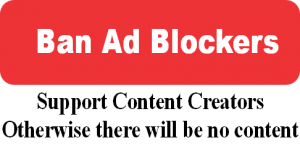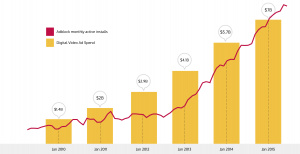AdBlock Plus is the most popular ad blocker on the web. This browser plugin has been downloaded and installed millions of times, and is available for a range of different browsers. Although AdBlock Plus is the most popular ad blocker, dozens of alternatives are available.
Why Ad-blocking is so controversial is because a vast majority of websites exist thanks to online advertising.
Millions of websites, from tiny blogs to huge corporate-owned magazines, depend on online advertising revenues in order to operate (Shewan, 2015).
A recent study from the Reuters Institute for The Study of Journalism, suggested that only 13% of the internet users in the US, find traditional banner advertising useful, and near half find it distracting to their experience. 29% already say they avoid certain sites because of it. Furthermore, there is strong reason to believe that those attitudes are leading to faster uptake of ad avoidance techniques, in particular among millennials. 57% of those aged 18 to 29 say they would consider using ad blocking software if the number of ads they were served continued to increase (Mascioli, 2015).
Quality online content comes with a cost. Authors, journalists, researchers, bloggers dedicate time and intellectual effort to provide you with news, insightful ideas and knowledge. The content which you can easily access online, costs the publisher money.
When you turn on ad blocking you minimize the content publisher’s revenue.
While ad blocking does have an indirect effect on publishers earning through cost per click based ads, many large publishers use ad-impressions (CPM) to earn from advertising.
Each time an ad is displayed it is counted as an ad-impression, irrespective of whether the user clicks on it. These ad-impressions turns in to money which is used by the content publisher to pay authors, journalists, researchers, staff and finally itself if presumably they have any profits left (Oberoi, 2015).
So why should you not be using ad blockers?
Well, first of all, it means that the authors and staff etc. does not get any money.
With less ad revenue, big and smaller content providers are financially damaged. The New York Times, Boston Globe and The Times use different paid digital content models in an effort to improve revenue and counteract losses, which ad blocking causes.
If websites and newspapers offer their content through subscriptions, the whole idea of ‘free access to information’ is gone.
The Internet is not going to be a fee-based service any time soon, but we’ll surely see publications getting more aggressive in their attempts to counteract their ad revenue losses. If online advertising no longer serves them, other money-making models will be discovered.
Ad blocking is urging publications and media giants to experiment with different revenue models as they realize online advertising is no longer a viable option. mainly due to the proliferation and enhancement of ad blocking technologies.
Using pay walls is not exactly a million-dollar idea, in fact many times it have had the opposite effect, with subscriptions being very poor and online visitors heading to alternative free newspapers for their daily news fix (Naughton, 2015).
Even though a lot of people see ad blocking as harmless, it does harm a lot of businesses.
For a commercially sustainable Internet, advertising is essential.
Publishers will adopt new models for revenue, which will most likely mean less and low-quality content will be available for free.
The rest will be on a pay-for basis.
Ad blocking is a wake-up call for advertising agencies and the media who use them, it’s telling them that consumers are becoming more discerning and demanding, but this could backfire as big news media and publications adopt more invasive advertising approaches including sponsored articles, back-links and so on.
In the end, it is not about feeling guilty for ad-blocking your favorite website, it is about realizing how your actions are to your disadvantage in the long-run.
References
Mascioli, G. (2015). Will Ad-Blocking Millennials Destroy Online Publishing Or Save It?. Available: http://www.forbes.com/sites/giannimascioli/2015/09/20/will-ad-blocking-millennials-destroy-online-publishing-or-save-it/#66ca29616a6b. Last accessed 25th April 2016.
Naughton, J. (2015). The rise of ad-blocking could herald the end of the free internet. Available: http://www.theguardian.com/commentisfree/2015/sep/27/ad-blocking-herald-end-of-free-internet-ios9-apple. Last accessed 25th April 2016
Oberoi, A. (2015). 5 Reasons How Ad Blocking is Killing Information On The Internet. Available: http://www.adpushup.com/blog/ad-blocking-bad-news-consumers/. Last accessed 25th April 2016.
Shewan, D. (2015). The Rise of Ad Blockers: Should Advertisers Be Panicking?(!!). Available: http://www.wordstream.com/blog/ws/2015/10/02/ad-blockers. Last accessed 25th April 2016.


